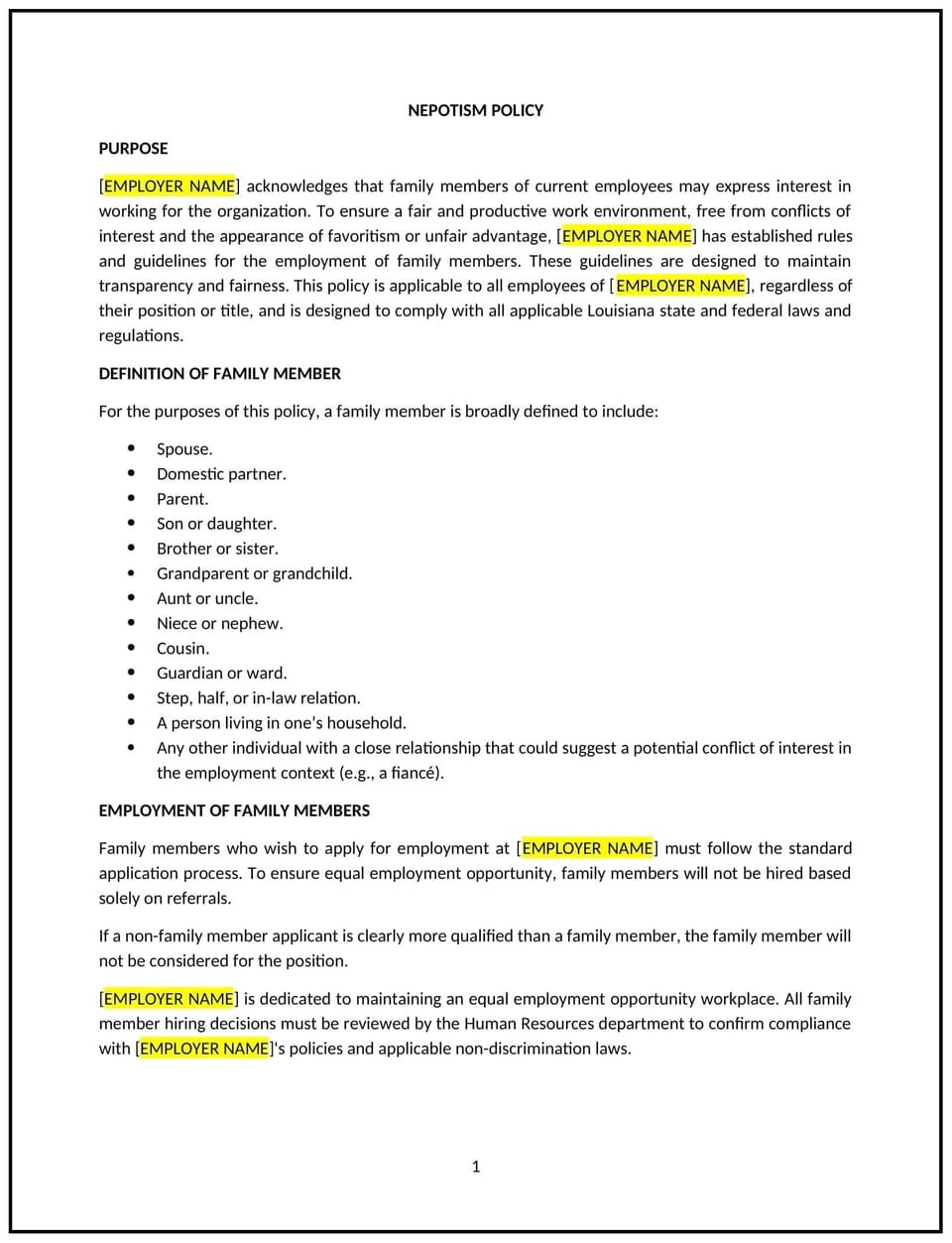Nepotism policy (Louisiana): Free template

Nepotism policy (Louisiana)
This nepotism policy is designed to help Louisiana businesses establish clear guidelines for managing employment relationships involving family members. It outlines procedures to prevent conflicts of interest, favoritism, and workplace disruptions while promoting fairness and professionalism.
By implementing this policy, businesses can maintain objectivity in hiring, supervision, and decision-making processes.
How to use this nepotism policy (Louisiana)
- Define nepotism: Clearly specify what constitutes nepotism, such as hiring, supervising, or making decisions that involve family members.
- Identify relationships covered: Include relationships such as immediate family, extended family, or others that could lead to perceived favoritism.
- Outline restrictions: Specify roles or situations where family members cannot work together, such as direct reporting relationships or roles with conflicting interests.
- Include disclosure requirements: Require employees to disclose any familial relationships that may create a conflict of interest.
- Establish decision-making guidelines: Provide procedures for ensuring impartiality in hiring, promotions, and other employment actions involving family members.
- Communicate consequences: Detail potential actions for failure to adhere to the policy, such as reassignment or termination.
Benefits of using a nepotism policy (Louisiana)
Implementing this policy provides several advantages for Louisiana businesses:
- Promotes fairness: Ensures employment decisions are based on merit, not personal relationships.
- Reduces conflicts: Minimizes workplace tensions or perceptions of favoritism.
- Protects professionalism: Maintains objectivity in management and decision-making processes.
- Encourages transparency: Fosters open communication about potential conflicts of interest.
- Reflects Louisiana-specific practices: Adapts to local workplace norms and family dynamics.
Tips for using this nepotism policy (Louisiana)
- Communicate early: Inform employees about the policy during onboarding and when updating workplace guidelines.
- Create reporting channels: Provide clear methods for employees to disclose familial relationships confidentially.
- Apply consistently: Ensure the policy is enforced uniformly across all levels of the organization.
- Monitor hiring processes: Implement checks to prevent favoritism during recruitment and promotions.
- Review regularly: Update the policy as needed to reflect changes in workplace practices or Louisiana-specific considerations.
Q: What is considered nepotism under this policy?
A: Nepotism involves hiring, supervising, or making employment decisions that favor family members or close personal relationships over objective qualifications.
Q: Which relationships are covered by this policy?
A: The policy typically includes immediate family members (spouses, children, parents) and may extend to siblings, in-laws, or others as defined in the policy.
Q: Are family members allowed to work in the same company?
A: Family members may work in the same company, but restrictions often apply to roles involving direct supervision or conflicting interests.
Q: How should employees disclose familial relationships?
A: Employees should notify HR or their manager of any relationships that could create a conflict of interest, following the procedures outlined in the policy.
Q: What actions can businesses take to address nepotism?
A: Businesses may reassign roles, adjust reporting structures, or take other measures to eliminate conflicts of interest and favoritism.
Q: How often should this policy be reviewed?
A: The policy should be reviewed annually or when workplace dynamics or Louisiana-specific needs evolve.
Q: How can businesses ensure fairness in implementing this policy?
A: Businesses can enforce the policy uniformly, provide training on its purpose, and maintain transparency in employment decisions.
This article contains general legal information and does not contain legal advice. Cobrief is not a law firm or a substitute for an attorney or law firm. The law is complex and changes often. For legal advice, please ask a lawyer.


